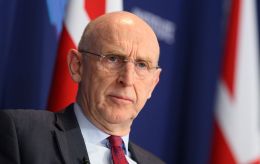German Foreign Minister criticizes Scholz's government for blocking additional aid to Ukraine
 Annalena Baerbock, the German Foreign Minister (photo: Getty Images)
Annalena Baerbock, the German Foreign Minister (photo: Getty Images)
Germany's Foreign Minister Annalena Baerbock indirectly criticized Chancellor Olaf Scholz for his reluctance to approve an additional aid package for Ukraine worth 3 billion euros (approximately 3.1 billion dollars), reports Politico.
During an interview, while discussing the German government's reluctance to approve the additional aid for Ukraine, she did not directly mention Scholz by name.
At the same time, the official noted that for some politicians in Germany, securing a few votes was more important than ensuring peace and freedom in Europe.
"Honestly that pains me," said the German foreign minister, commenting on the situation.
Additionally, Baerbock, who insisted on passing the €3 billion aid package for Ukraine, has repeatedly expressed concern about what she sees as Berlin's uncertain approach to supporting Kyiv.
In an interview with Politico, the German Foreign Minister noted that Scholz's behavior had also damaged the trust of European allies in Germany, as the government was losing its confidence.
"That trust must not be damaged again by hesitation, which could make other countries worry that Germany won’t stand by them," said Baerbock.
Intense debates in Germany over the freeze of aid to Ukraine
Earlier this week, Scholz sparked intense political debates in Germany by conditioning new aid to Ukraine on the relaxation of strict budgetary constraints in his country.
At the same time, top representatives from various parties in Germany insisted on passing the €3 billion aid package for Ukraine ahead of the national elections in Germany on February 23.
However, Scholz promised to support the aid package only if it was financed through new borrowing.
It is also noted that Germany, which is the second-largest provider of financial and military support to Ukraine after the US, is currently grappling with a significant budget deficit amid economic stagnation.
The Green Party, represented by Baerbock, and the Social Democratic Party of Germany (SPD) of Scholz are currently partners in a minority government following the collapse of the ruling coalition in November. However, both political forces are also competing in the upcoming early elections, set for February 23.
Since right-wing parties, such as the Christian Democratic Union and the conservative Free Democratic Party, which generally support increasing aid to Ukraine, oppose taking on new debt to finance the support, the package for Ukraine is likely to be stalled due to a political deadlock, according to Politico.
Germany's aid to Ukraine and questions regarding the new package
Germany is one of the leading countries in providing aid to Ukraine. On January 12, German Foreign Minister Baerbock warned against significantly reducing Berlin's financial support for weapons deliveries to Ukraine in response to Russia's large-scale military aggression.
According to Baerbock, the German government allocated nearly 7 billion euros to support Ukraine last year.
By the way, the previous German state budget for 2025 includes approximately 4 billion euros in military aid for Ukraine.
It was also reported that on January 7, Germany's Defense Minister Pistorius announced that Germany would soon send additional Iris-T missiles to Ukraine.
On January 10, the media reported that Germany was preparing new large packages of military aid for Ukraine, which could be provided in the first half of 2025. These packages would include, among other things, air defense systems, tanks, and howitzers.
At the same time, on the same day, the German weekly Der Spiegel wrote that German Chancellor Olaf Scholz was allegedly opposed to providing an additional 3 billion euros in aid to Ukraine.
Der Spiegel indicated that the provision of such a package to Kyiv before the Bundestag elections is supported by Germany's Defense Minister Boris Pistorius and Foreign Minister Annalena Baerbock, respectively.
On January 13, Germany's Defense Minister Boris Pistorius assured that there was no blockage of the new aid package for Ukraine from Chancellor Scholz. He added that the German Ministry of Defense had prepared a new aid package, and now a political decision needed to be made regarding its provision to Ukraine.
Later, Pistorius stated that the German government was still working on providing the 3 billion euro package to Ukraine. However, he added, the process was not finalized due to fiscal issues.

